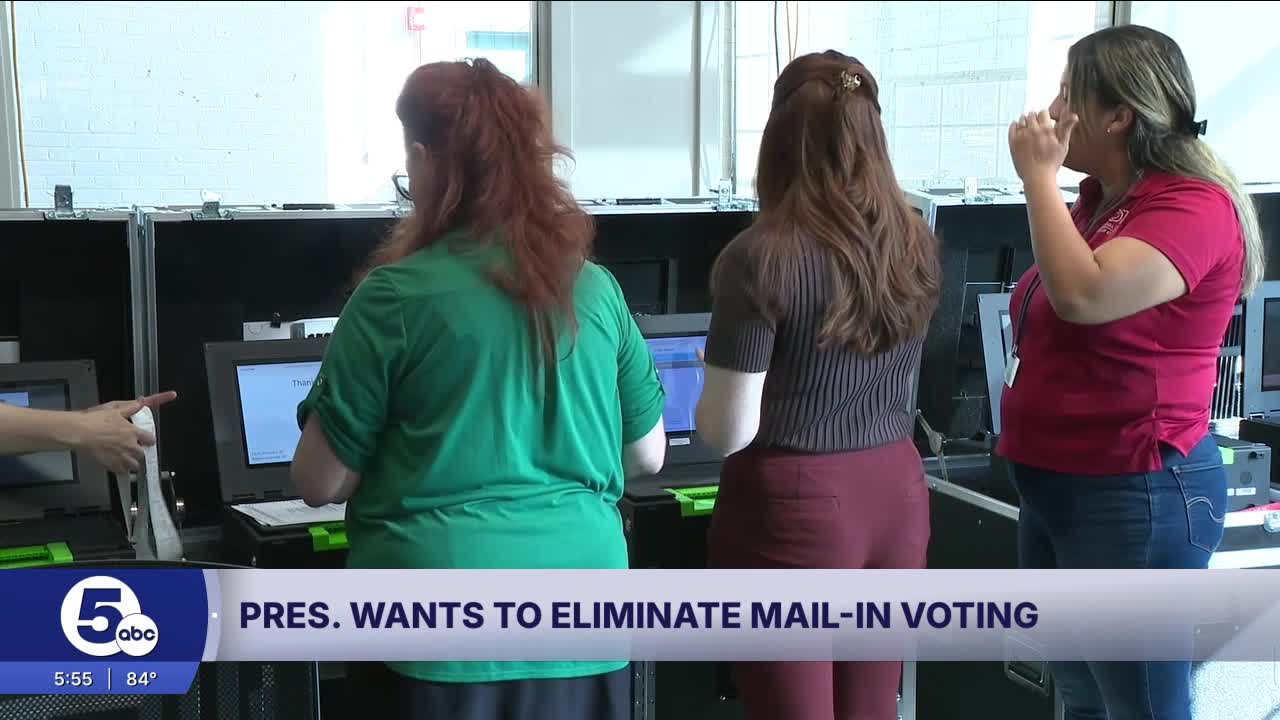COLUMBUS, Ohio — More registered Republicans voted by mail in 2024 in Ohio than Democrats did, yet President Donald Trump wants to ban the option due to unsubstantiated claims of fraud.
Just in the Nov. 2024 general election, 1.1 million Ohioans voted by mail.
"I like voting because I believe that our democracy works best when we're all participating," Jen Miller with the League of Women Voters of Ohio said.
It's proven to be safe, secure and effective for each party, Miller said.
Data from the 2024 general election shows that the main demographic utilizing absentee ballots is voters above the age of 65 by a significant amount. That age group returned about 520,000 ballots by mail, while the second closest was 55-64 with about 205,000 returned.

Unaffiliated voters led the pack. Registered Republicans came in second, with Democratic voters following. Ohioans do not need to register with a party to vote in the election, only in primaries, which the majority of registered voters do not participate in.

"It's particularly important for older adults, military members, rural Ohioans, voters with disabilities and students," Miller said about voting by mail.
Republican Secretary of State Frank Larose has done audits of all elections he has presided over. Not one has shown evidence of widespread voter fraud.
Yet, Trump wants to stop that method of voting.
"Mail-in ballots are corrupt," Trump said Monday. "Mail-in ballots, you can never have a real democracy with mail-in ballots."
The President said his team was drafting an executive order to ban the use of not just mail-in ballots, but also voting machines and tabulators, which allow Ohio boards of elections to get results out on election night.
"Massive fraud all over the place," Trump said.
Case Western Reserve University nonpartisan elections law professor Atiba Ellis said that Trump’s plan won’t work.
"Trump does not have the power to do this," Ellis said. "At best, it's in the hands of Congress to dictate how federal elections work and therefore he cannot simply, by executive order, change how American democracy has worked — and worked safely for centuries."
LaRose touts Ohio as the “gold standard” of elections. We sent him a list of questions about Trump's comments.
“We look forward to reviewing the details of what the President is proposing," LaRose spokesperson Ben Kindel said. "Changes to Ohio's voting process require a vote of the General Assembly, so I'm sure we'll be talking with them as well."
We also reached out with questions to both major declared candidates for secretary of state, Republican Treasurer Robert Sprague and Democratic doctor Bryan Hambley.
"We share many of President Trump’s concerns over election integrity. We look forward to seeing his Executive Order and working with the Administration to ensure that Ohio elections remain fair and honest," Sprague's campaign spokesperson Dalton Throckmorton said.
After asking, the campaign declined to say which concerns they shared with Trump. Hambley was outright against it.
"Both of these proposals are bad ideas. There is no evidence of widespread voter fraud, and Ohio's current Secretary of State has stated that our elections are secure. Cutting access to vote by mail would make it harder for folks in every corner of Ohio to vote. It would disproportionately harm folks in rural communities and our service members overseas. Removing voting machines and requiring counties to count ballots manually would be a much slower process, and would ultimately cost taxpayers much more because of the hours of labor needed. Ohioans deserve a democracy where it is easy and fair for every Ohio citizen to vote," Hambley responded.
The state's perspective is essential to the debate, Ellis said.
"States get to make the rules, including allowing different forms of voting," Ellis added.
Miller has consistently fought against Ohio Republicans’ efforts to impose more restrictions on voting, including requiring a photo ID and limiting ballot drop box access — both of which went into law. She worries Trump’s rhetoric will cause the state to look for even more ways to make it harder to vote.
"If we do have those drastic overhauls, it's likely going to mean more work for boards of elections, more expense for taxpayers, less access for voters, and overall, an election system that does not run as well," Miller said.
Voting rights groups say they are ready to file a lawsuit against any federal executive order attempting to change the way Ohio currently votes.
Follow WEWS statehouse reporter Morgan Trau on Twitter and Facebook.




